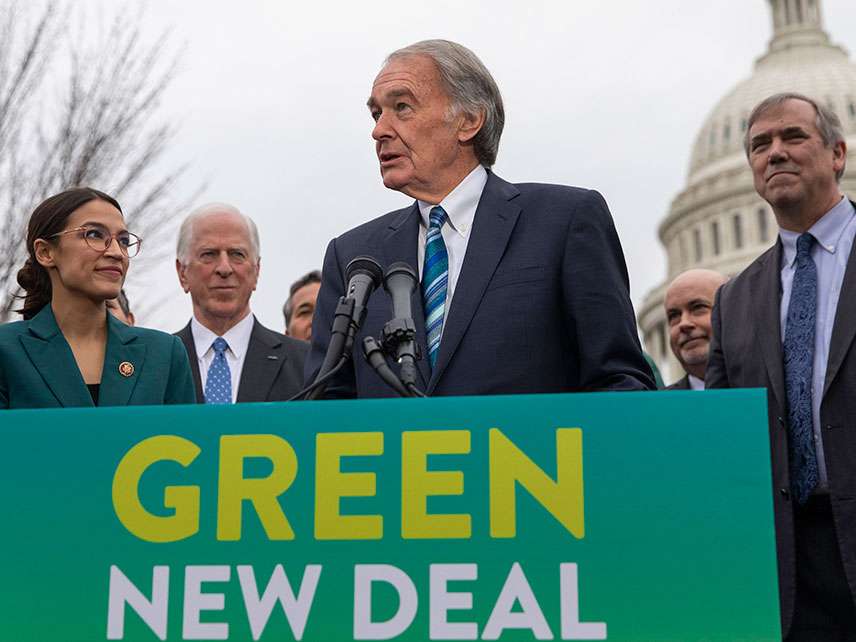The Co-Sponsor of the Green New Deal Thinks Mitch McConnell's Plan to Hold a Vote on It Is 'Sabotage' and a 'Republican Trick'
Ed Markey believes the time to vote on urgently necessary climate change legislation is...later.

Last week, when Rep. Alexandria Ocasio-Cortez (D-N.Y.) and Sen. Edward Markey (D-Mass.) introduced the Green New Deal, a resolution calling for a massive, government-driven overhaul of the U.S. economy in order to address climate change, Markey tweeted that the plan's "transformative legislative goals are what is needed to address the generational challenge of climate change." In an accompanying press release, he said climate change should be "the highest of Congressional priorities," and he stressed that time was of the essence, saying "we need bold action to avoid the worst impacts of climate change, and we may have as few as 12 years to achieve it."
Apparently, however, such action can wait a little longer.
Yesterday, Senate Majority Leader Mitch McConnell (R-Ky.) indicated that he would soon hold a vote on the plan, which has been endorsed by a number of the Democrats' 2020 presidential contenders in the Senate, including Sens. Kamala Harris (Ca.), Cory Booker (N.J.), and Kirsten Gillibrand (N.Y.). The idea, McConnell said, would be to "give everybody an opportunity to go on record and see how they feel about the Green New Deal."
In response, Markey—who is, again, one of the two lead sponsors of the resolution—accused McConnell of attempting to "sabotage" the plan by "rushing a vote" on the Green New Deal. McConnell's plan to ask Markey and his fellow senators to vote on the resolution they endorsed was a "Republican trick."
This isn't a new Republican trick. By rushing a vote on the #GreenNewDeal resolution, Republicans want to avoid a true national debate & kill our efforts to organize. We're having the first national conversation on climate change in a decade. We can't let Republicans sabotage it.
— Ed Markey (@SenMarkey) February 12, 2019
One might counter that putting forth a wildly over-ambitious resolution that you don't want to vote on, presumably because you believe doing so would harm both your party's political fortunes and your political goals, is itself a form of self-sabotage. This does not appear to have occurred to Markey.
The various reactions to the Green New Deal have been deeply revealing, at least insofar as the politics are concerned.
On the one hand, the resolution—which attaches a slew of largely unrelated progressive policy priorities related to health care, education, and welfare programs to the putative central goal of eliminating carbon emissions—has been embraced by much of the Democrats' 2020 presidential field. It is indicative of the race's leftward tilt, in which multiple candidates are moving aggressively to appeal to the party's emboldened progressive wing.
On the other hand, seasoned political pros like McConnell and House Speaker Nancy Pelosi (D-Ca.), who last week dismissed the Green New Deal as "the green dream or whatever," appear to view the plan as a poison pill for Democrats, who, by voting for it, would be asked to defend the plan's least popular, most outlandish ideas.
McConnell and Pelosi are arguably the most savvy political tactitions for each party, and they both appear to believe that the Green New Deal, and the all-encompassing progressive policy agenda it represents, is a clear misstep. The reaction from Markey, who now opposes a vote on a resolution he cast as urgently necessary just last week, suggests he may be belatedly coming around to the view that they are right.


Show Comments (153)